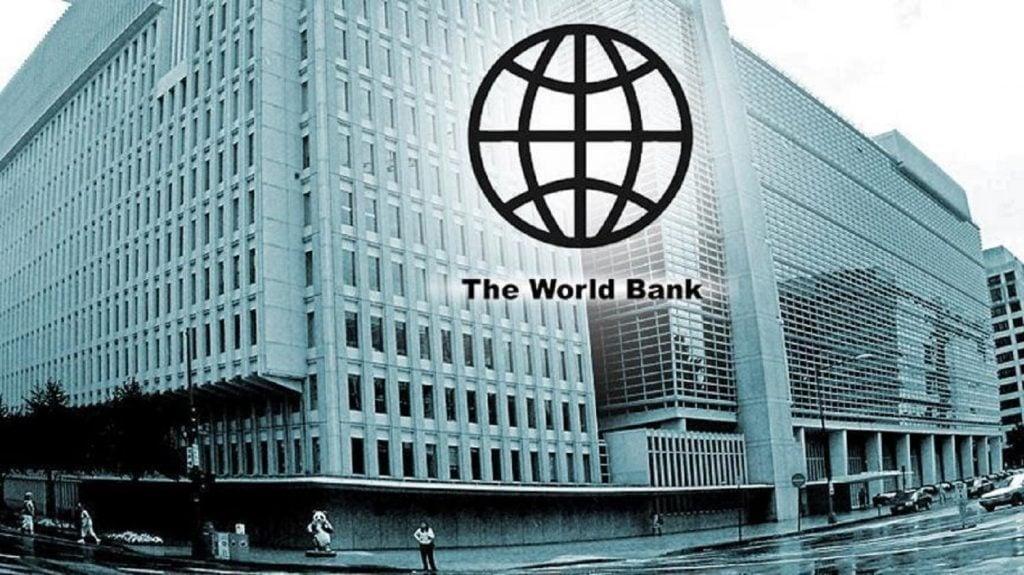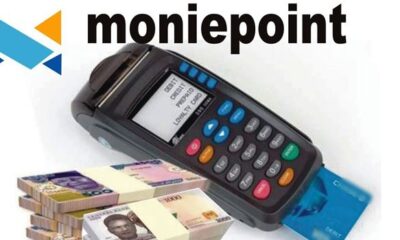Business
World Bank Approves Fresh $700m Loan For Nigeria
Published
7 months agoon
By
Editor
The World Bank has approved a fresh $700m loan for Nigeria to enhance adolescent girls’ learning and empowerment.
It disclosed this in a statement published on its website on Friday.
The new loan is to provide additional funds for an ongoing project known as the Adolescent Girls Initiative for Learning and Empowerment.
The statement read, “The World Bank approved additional financing of $700m for Nigeria to scale up the Adolescent Girls Initiative for Learning and Empowerment programme whose goal is to improve secondary education opportunities among girls in targeted states.
“The additional financing will scale up project activities from the current seven states to eleven additional states and increase the targeted beneficiaries to include out-of-school girls, those who are married, and those who have disabilities.”
READ ALSO: Why We Wrote World Bank Over FG’s Proposed $800 Million Loan — Activist Reveals
It was noted that Nigeria had over 12 million to 15 million out of school children in the school- age group, with many of them in Northern Nigeria.
It was also noted that an estimated one million children were affected by increased insecurity around schools in 2020-2021.
The statement added, “In the seven AGILE programme implementing states – Borno, Ekiti, Kaduna, Kano, Katsina, Kebbi, and Plateau – the number of girls in secondary schools has increased from about 900,000 to over 1.6 million.
“Under the programme, over 5,000 classrooms have been renovated and over 250,000 eligible girls have received scholarships.
“The AGILE programme has supported construction and rehabilitation of WASH facilities in secondary schools and the installation of computers and solar panels which make attending school more convenient and conducive for both girls and boys. Life skills, systems strengthening, and advocacy are other key aspects of the program which address social norms impeding girls’ education.”
READ ALSO: US Warns Citizens Not To Visit Enugu, Delta, Bayelsa, 15 Others
The World Bank Country Director for Nigeria, Shubham Chaudhuri, stated that, “Closing the gender gaps in economic empowerment by ensuring girls have access to education and skills is key for Nigeria’s development and economic prosperity.
“Nigeria’s working population will soon be one of the youngest and largest around the world, which means that investing in adolescent girls is imperative when addressing overall economic prospects and growth.”
The statement noted that aside from the girls that would benefit from the financing, others included over 15 million students and beneficiaries, such as teachers, administrators, families, communities, and staff in existing and newly constructed schools.
It added that the new fund would push the project to 18 states and help Nigeria to achieve better education and health outcomes for girls.
Earlier, The PUNCH reported that the parents and caregivers of about 300,000 poor female students got N10,000 per term in six states as incentives for schooling.
READ ALSO: CAF Confederation Cup: Bendel Insurance Held To 2-2 Draw
The six states were Kaduna, Kano, Katsina, Sokoto, Kebbi and Plateau, and the funding was provided through the Adolescent Girls Initiative for Learning and Empowerment Programme.
The World Bank noted that the N10,000 per term was provided to the parents of poor female students for school attendance and re-enrollment.
It was also disclosed that N5,000 was given to each girl’s parent upon registration in the program.
It was also observed that this was the third loan facility approved under the administration of Bola Tinubu.
The first was approved on June 9, 2023, with a loan of $750m to boost Nigeria’s power sector.
The second was a loan of $500m to help Nigeria drive women’s empowerment, and was approved on June 22, 2023.
PUNCH
You may like


JUST IN: FirstBank Gets New MD/CEO


Nigeria Set To Receive Fresh $2.2bn World Bank Loan – Edun


Moniepoint MFB Unveils USSD Code To Combat Fraud, Enhance Convenience


How 15,000 Ethiopian Bank’s Customers Returned Cash Illegally Withdrawn During Glitch


Leading Ladies: Meet 10 Female CEOs Shaping Nigeria’s Banking Sector [PHOTOS]


JUST IN: Access Bank To Acquire National Bank Of Kenya

The Central Bank of Nigeria (CBN) started fresh and direct sales of US dollars at N1,021 per dollar to Bureau De Change operators.
Nigeria’s apex bank disclosed this in a circular signed by its Director of Trade and Exchange Department Hassan Mahmud.
“We write to inform you of the sale of $10,000 by the Central Bank of Nigeria (CBN) to BDCs at the rate of N1,021/$1. The BDCs are in turn to sell to eligible end users at a spread of NOT MORE THAN 1.5 percent above the purchase price,” the circular posted on its website read.
READ ALSO: Tinubu Unveils African Counter-Terrorism Summit
“ALL eligible BDCs are therefore directed to commence payment of the Naira deposit to the underlisted CBN Naira Deposit Account Numbers from today, Monday, April 22, 2024, and submit confirmation of payment, with other necessary documentations, for disbursement of FX at the respective CBN Branches.”
CBN’s move is coming as the naira is recording a slight depreciation against the dollar after weeks of gains.
In late March, the bank also sold $10,000 to each of the eligible Bureau De Change (BDC) operators in the country at the rate of N1,251/$1.
READ ALSO: Mixed Reactions Trail Video Of Couple’s Customised N200 Notes
Like in the most recent sales, it warned BDCs against breaching terms of the dollar sales, vowing to sanction defaulters “including outright suspension from further participation in the sale”.
The fortunes of the naira have fallen sharply since President Bola Tinubu took over in May. Inflation figures have reached new highs and the cost of living hitting the rooftops.
Nigeria’s currency slid to about N1,900/$ some months ago at the parallel market. But in recent weeks, it has gained against the dollar.
The Nigerian authorities have also doubled down on their crackdown against cryptocurrency platform Binance and illegal BDCs.
On March 1, the CBN revoked the licences of 4,173 BDCs over compliance failures.

Olusegun Alebiosu has been appointed as the Acting Managing Director/Chief Executive Officer of First Bank of Nigeria Limited (FirstBank Group), effective April 2024.
Alebiosu steps into this pivotal role from his previous position as the Executive Director, Chief Risk Officer, and Executive Compliance Officer, a position he held since January 2022.
Alebiosu brings to the helm of FirstBank over 28 years of extensive experience in the banking and financial services industry. His expertise spans various domains including credit risk management, financial planning and control, corporate and commercial banking, agriculture financing, oil and gas, transportation, and project financing.
READ ALSO: JUST IN: Access Holdings Names New Acting CEO
Having embarked on his professional journey in 1991 with Oceanic Bank Plc. (now EcoBank Plc.), Alebiosu has held several notable positions in esteemed financial institutions.
Prior to joining FirstBank in 2016, he served as Chief Risk Officer at Coronation Merchant Bank Limited, Chief Credit Risk Officer at the African Development Bank Group, and Group Head of Credit Policy & Deputy Chief Credit Risk Officer at United Bank for Africa Plc.
Alebiosu’s academic credentials further enrich his professional profile. He is an alumnus of the Harvard School of Government and holds a Bachelor’s degree in Industrial Relations and Personnel Management. Additionally, he obtained a Master’s degree in International Law and Diplomacy from the University of Lagos, as well as a Master’s degree in Development Studies from the London School of Economics and Political Science.
READ ALSO: Meet Newly Appointed Union Bank CEO
A distinguished member of various professional bodies, including the Institute of Chartered Accountants (FCA), Nigeria Institute of Management (ANIM), and Chartered Institute of Bankers of Nigeria (CIBN), Alebiosu is renowned for his commitment to excellence and ethical practices in the banking sector.
Beyond his professional endeavors, Alebiosu is known for his passion for golf and adventure. He is happily married and a proud parent.
With Alebiosu’s appointment, FirstBank of Nigeria Limited anticipates continued growth and innovation under his leadership, reinforcing its position as a leading financial institution in Nigeria and beyond.
Business
CBN Gives New Directive On Lending In Real Estate
Published
1 week agoon
April 17, 2024By
Editor
The Central Bank of Nigeria, CBN, has released a new regulatory directive to enhance lending to the real sector of the Nigerian economy.
The directive, issued on April 17, 2024, with reference number BSD/DIR/PUB/LAB/017/005 and signed by the Acting Director of Banking Supervision, Adetona Adedeji, signifies a notable shift in the bank’s policy towards a more contractionary approach.
In line with the new measures, the CBN has reduced the loan-to-deposit ratio by 15 percentage points, down to 50 per cent.
This move aligns with the CBN’s current monetary tightening policies and reflects the increase in the Cash Reserve ratio rate for banks.
READ ALSO: JUST IN: CBN Gov Sacks Eight Directors, 32 Others
The LDR is a metric used to evaluate a bank’s liquidity by comparing its total loans to its total deposits over the same period, expressed as a percentage.
An excessively high ratio may indicate insufficient liquidity to meet unexpected fund requirements.
All Deposit Money Banks are now mandated to adhere to this revised LDR.
The CBN has stated that average daily figures will be utilised to gauge compliance with this directive.
Furthermore, while DMBs are encouraged to maintain robust risk management practices in their lending activities, the CBN has committed to continuous monitoring of adherence and will adjust the LDR as necessary based on market developments.
READ ALSO: JUST IN: CBN Increases Interest Rate To 24.75%
Adedeji has called on all banks to acknowledge these modifications and adjust their operations accordingly. He emphasised that this regulatory adjustment is anticipated to significantly influence the banking sector and the wider Nigerian economy.
The circular read in part, “Following a shift in the Bank’s policy stance towards a more contractionary approach, it is crucial to revise the loan-to-deposit ratio policy to conform with the CBN’s ongoing monetary tightening.
“Consequently, the CBN has decided to decrease the LDR by 15 percentage points to 50 per cent, proportionate to the rise in the CRR rate for banks.
“All DMBs must maintain this level, and it is advised that average daily figures will still be applied for compliance assessment.
“While DMBs are urged to sustain strong risk management practices concerning their lending operations, the CBN will persist in monitoring compliance, reviewing market developments, and making necessary adjustments to the LDR. Please be guided accordingly.”

EFCC Boss Appoints Chief Of Staff, 14 Zonal Directors

Why I Hate Mohbad More In Death – Naira Marley’s Associate

86-year-old Injured As Fire Guts Building In Kwara
Trending

 Entertainment5 days ago
Entertainment5 days agoBridesmaids’ Dance At Wedding Causes Stir On Social Media [VIDEO/PHOTOS]

 Metro5 days ago
Metro5 days agoVIDEO: ‘UNN Lecturer’ Caught Pants Down With Married Student

 News3 days ago
News3 days agoDrama! Supporters Of Yahaya Bello Perform Rituals to Prevent His Arrest By EFCC [Video]

 Headline4 days ago
Headline4 days agoDrama As Women Fight Dirty, Breasts Fall Out During Spring Break Outing In US [PHOTOS/VIDEO]

 Entertainment3 days ago
Entertainment3 days agoNollywood Actor, Zulu Adigwe Is Dead

 News3 days ago
News3 days agoVIDEO: Force PRO Orders Arrest Officers Caught On Video Bashing Driver’s Car

 Headline4 days ago
Headline4 days agoMeet 17-year-old Nigerian Who Won $3.5m Worth Of Scholarships From Harvard, 13 Other Foreign Universities

 Metro3 days ago
Metro3 days agoEdo Cultists Kill Rival In Daughter’s Presence, Abandon Getaway Car

 Headline4 days ago
Headline4 days agoVideo Of Girl Being Bullied, Slapped At Lead British School Sparks Outrage Online [PHOTOS/VIDEO]

 Politics5 days ago
Politics5 days agoEdo Guber Final List : Group Knocks LP, Commends, INEC, Yakubu



































